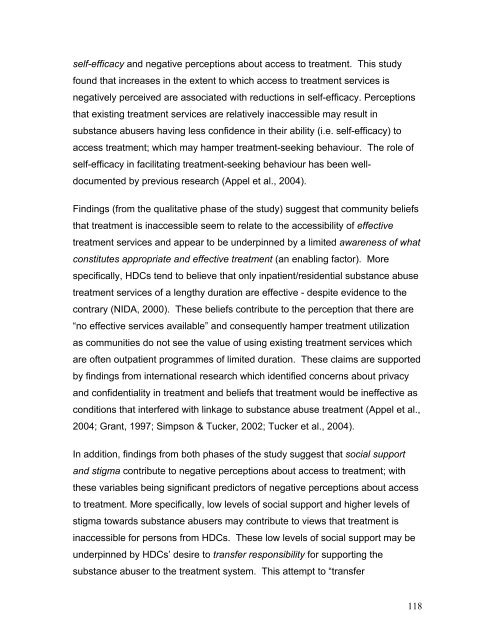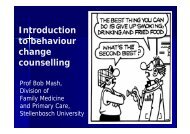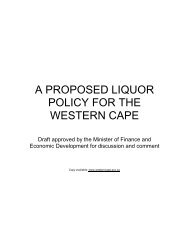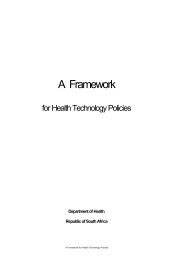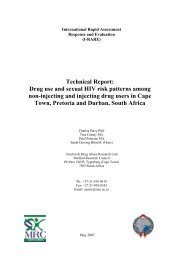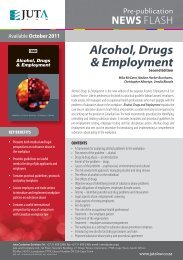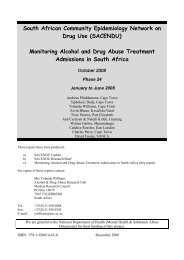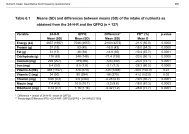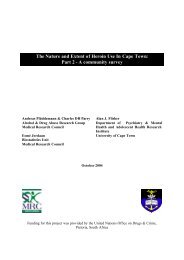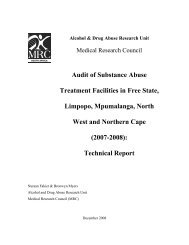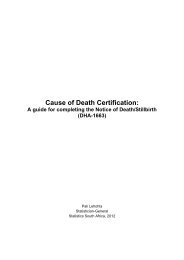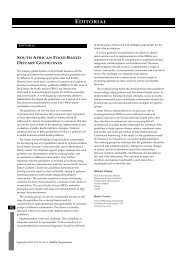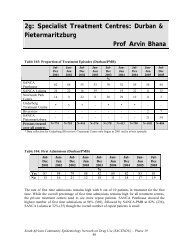Access to substance abuse treatment in the Cape Town metropole ...
Access to substance abuse treatment in the Cape Town metropole ...
Access to substance abuse treatment in the Cape Town metropole ...
Create successful ePaper yourself
Turn your PDF publications into a flip-book with our unique Google optimized e-Paper software.
self-efficacy and negative perceptions about access <strong>to</strong> <strong>treatment</strong>. This studyfound that <strong>in</strong>creases <strong>in</strong> <strong>the</strong> extent <strong>to</strong> which access <strong>to</strong> <strong>treatment</strong> services isnegatively perceived are associated with reductions <strong>in</strong> self-efficacy. Perceptionsthat exist<strong>in</strong>g <strong>treatment</strong> services are relatively <strong>in</strong>accessible may result <strong>in</strong><strong>substance</strong> <strong>abuse</strong>rs hav<strong>in</strong>g less confidence <strong>in</strong> <strong>the</strong>ir ability (i.e. self-efficacy) <strong>to</strong>access <strong>treatment</strong>; which may hamper <strong>treatment</strong>-seek<strong>in</strong>g behaviour. The role ofself-efficacy <strong>in</strong> facilitat<strong>in</strong>g <strong>treatment</strong>-seek<strong>in</strong>g behaviour has been welldocumentedby previous research (Appel et al., 2004).F<strong>in</strong>d<strong>in</strong>gs (from <strong>the</strong> qualitative phase of <strong>the</strong> study) suggest that community beliefsthat <strong>treatment</strong> is <strong>in</strong>accessible seem <strong>to</strong> relate <strong>to</strong> <strong>the</strong> accessibility of effective<strong>treatment</strong> services and appear <strong>to</strong> be underp<strong>in</strong>ned by a limited awareness of whatconstitutes appropriate and effective <strong>treatment</strong> (an enabl<strong>in</strong>g fac<strong>to</strong>r). Morespecifically, HDCs tend <strong>to</strong> believe that only <strong>in</strong>patient/residential <strong>substance</strong> <strong>abuse</strong><strong>treatment</strong> services of a lengthy duration are effective - despite evidence <strong>to</strong> <strong>the</strong>contrary (NIDA, 2000). These beliefs contribute <strong>to</strong> <strong>the</strong> perception that <strong>the</strong>re are“no effective services available” and consequently hamper <strong>treatment</strong> utilizationas communities do not see <strong>the</strong> value of us<strong>in</strong>g exist<strong>in</strong>g <strong>treatment</strong> services whichare often outpatient programmes of limited duration. These claims are supportedby f<strong>in</strong>d<strong>in</strong>gs from <strong>in</strong>ternational research which identified concerns about privacyand confidentiality <strong>in</strong> <strong>treatment</strong> and beliefs that <strong>treatment</strong> would be <strong>in</strong>effective asconditions that <strong>in</strong>terfered with l<strong>in</strong>kage <strong>to</strong> <strong>substance</strong> <strong>abuse</strong> <strong>treatment</strong> (Appel et al.,2004; Grant, 1997; Simpson & Tucker, 2002; Tucker et al., 2004).In addition, f<strong>in</strong>d<strong>in</strong>gs from both phases of <strong>the</strong> study suggest that social supportand stigma contribute <strong>to</strong> negative perceptions about access <strong>to</strong> <strong>treatment</strong>; with<strong>the</strong>se variables be<strong>in</strong>g significant predic<strong>to</strong>rs of negative perceptions about access<strong>to</strong> <strong>treatment</strong>. More specifically, low levels of social support and higher levels ofstigma <strong>to</strong>wards <strong>substance</strong> <strong>abuse</strong>rs may contribute <strong>to</strong> views that <strong>treatment</strong> is<strong>in</strong>accessible for persons from HDCs. These low levels of social support may beunderp<strong>in</strong>ned by HDCs’ desire <strong>to</strong> transfer responsibility for support<strong>in</strong>g <strong>the</strong><strong>substance</strong> <strong>abuse</strong>r <strong>to</strong> <strong>the</strong> <strong>treatment</strong> system. This attempt <strong>to</strong> “transfer118


